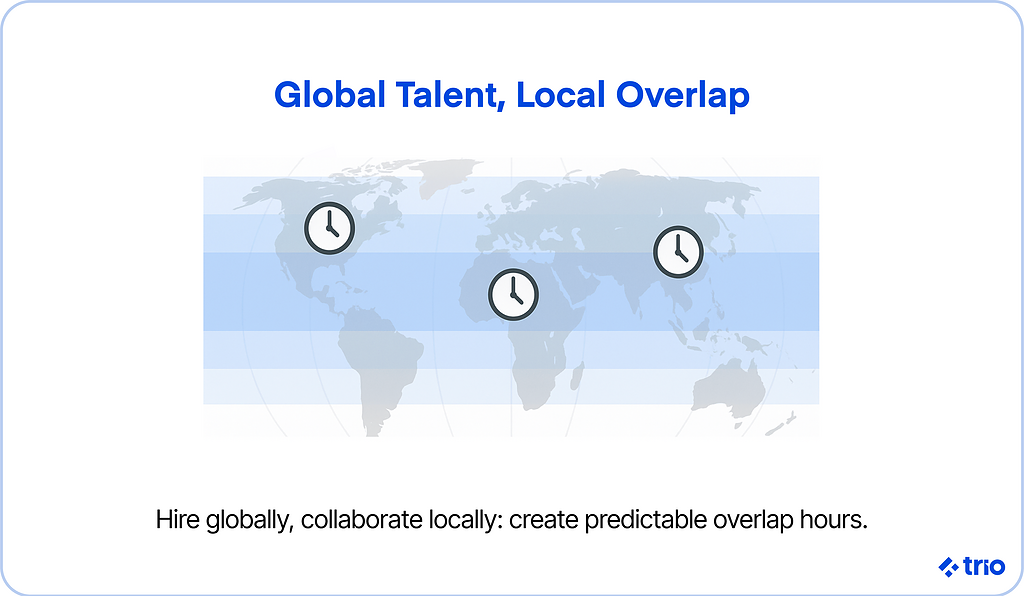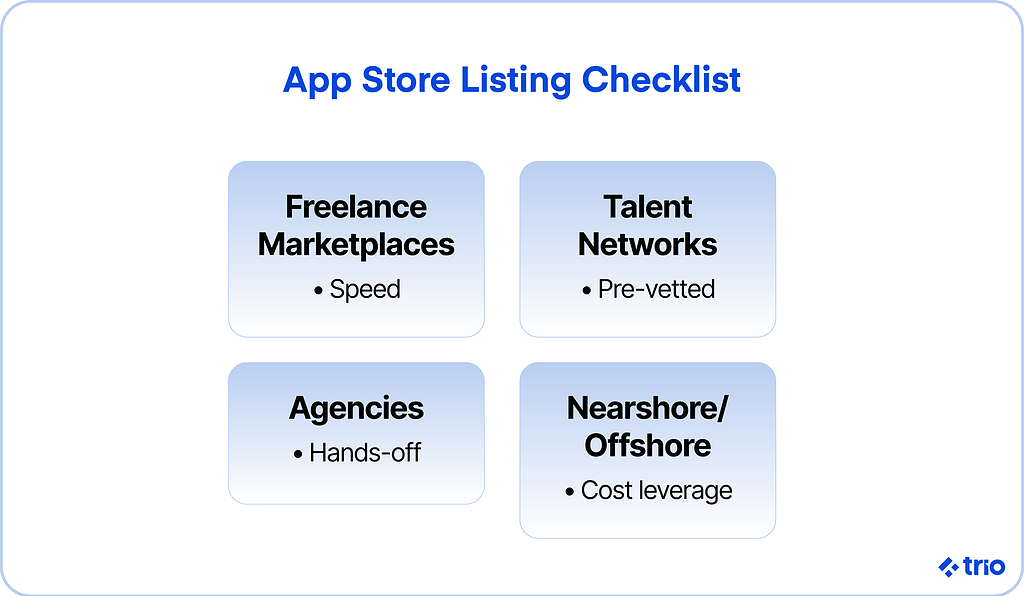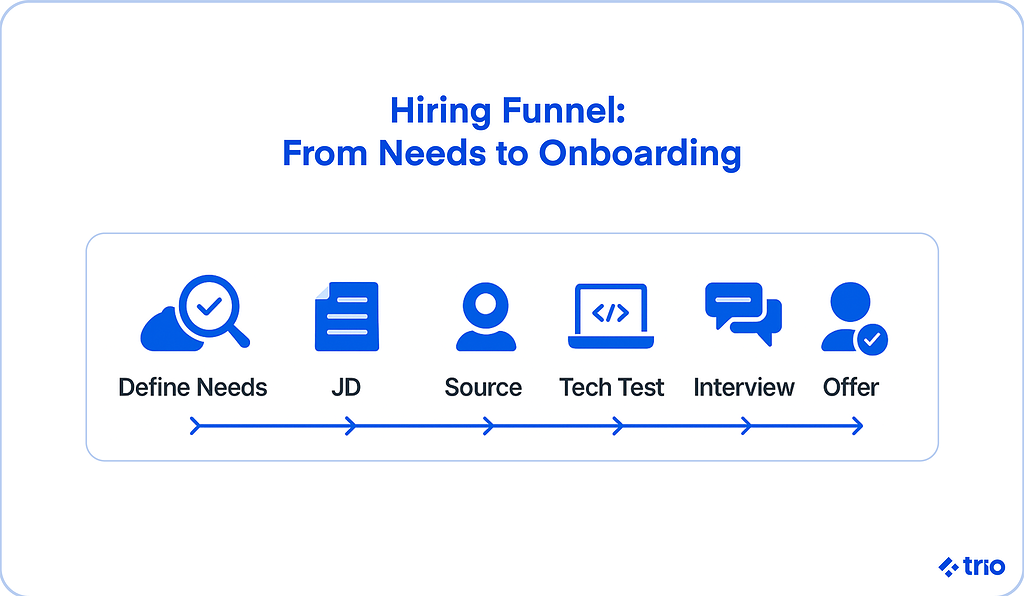If you’re trying to hire remote developers, you already know how challenging it can be to find people who communicate well, deliver reliably, and integrate into your existing team without friction.
Finding the right developer will have a direct effect on the success of your project.
Not only do you want to hire someone skillful, but you also want to ensure that your hire is capable of working in the team, shares company values, and is motivated by more than just a paycheck.
It may sound hard to believe, but the people who make up your company are actually your greatest assets towards long-term business growth.
But what do you do if you need additional talent yet you’re not in the market for an ongoing commitment?
You might find that hiring a freelancer or independent contractor can be a viable solution for your business.
This way, you can use remote developers to fulfill the requirements of your project. Even so, success isn’t necessarily guaranteed.
In fact, in 2025, over 40% of global job listings mention remote or hybrid options.

Whether you’re building an MVP, expanding an engineering team, or looking for long-term product support, this guide walks you through how to hire remote software developers effectively.
We’ll highlight not just what to look for in a great developer, but also where to find them, how to evaluate them, and best practices for managing distributed teams, drawing from our extensive experience in software outsourcing and staff augmentation.
Why Are Companies Hiring Remote Software Developers?
Many companies are relying on the gig economy to hire remote software developers rather than hiring a remote, in-house team.
Sometimes hiring full-time employees can be impractical.
Here are some reasons why:
Cost
A tight budget is often the primary reason businesses consider hiring freelancers or independent contractors for software engineers.
Remote software developers can alleviate costs related to:
- Taxes
- Legal fees
- Pension contributions
- Medical leaves
- Infrastructure, and
- Office equipment.
No question that hiring remote software developers is cost-effective.
Not to mention, you’ll spare your wallet from paying full-time salaries when your project doesn’t need full-time commitment.
In fact, some businesses can save 40% – 60% on development costs by hiring remote teams compared to maintaining in-house staff.
Timeline
Selecting, interviewing, hiring, and onboarding job candidates is a time-consuming and often tedious process that could take weeks, if not months.
Software development is a fast-paced market that is constantly changing.
Spending too much time on the hiring process could very well cost you on a time-sensitive project.
On the other hand, spending too little time on the hiring process could result in an unsuitable hire.
In short, you can’t waste time. The following section will delve deeper into what to look for when hiring software developers.
With access to global talent networks, many companies can now onboard skilled developers in days instead of months, giving them a competitive edge on time-sensitive projects.
With a clearer understanding of the qualities that define a good developer, you’ll be able to make better decisions faster.
Beyond that, with access to global talent networks, like the kind we are able to access here at Trio, many companies can now onboard skilled developers in days instead of months, giving them a competitive edge on time-sensitive projects.
Qualifications
Finding the right match isn’t easy. Professional qualifications include much more than just a degree.
You need to be on the lookout for relevant previous work experience, a versatile skill set, and even useful personality quirks that the candidate can bring to the table.
But talk is cheap. These skills need to be tested in real-time so you can know for sure that you’ve chosen the right candidate.
However, streamlining this process can be a complicated task if you’re on your own.
Online marketplaces typically feature an extensive network of candidates who have already passed an intensive screening process.
The companies behind these networks do the grueling work so you don’t have to. This saves you valuable time and resources.
Beyond technical skills, today’s hiring managers also weigh cultural fit, time-zone alignment, and communication style as heavily as technical expertise. These soft qualifications can make or break a remote hire.
Challenges of Hiring Remote Developers
Hiring remote developers can open the door to incredible talent, but it’s not without its complications. Before you dive in, it helps to think through some of the common stumbling blocks teams run into.
Time Zone Differences
Coordinating across time zones often sounds easier than it turns out to be.
A standup that works perfectly for a team in London may leave someone in Sydney bleary-eyed at 2 a.m.
Creating a few overlapping hours for real-time meetings and relying more heavily on async tools (like detailed Slack updates or Loom recordings) usually keeps things moving. However, you’ll likely need some trial and error before finding the sweet spot.
Cultural Fit and Communication
Bringing people together from different countries and backgrounds is a considerable strength of remote teams, but it doesn’t come without friction.
What feels like direct and efficient feedback to one developer may come across as blunt or dismissive to another. Clear expectations, along with communication habits that err on the side of clarity rather than speed, tend to smooth things out.
Some teams even run short sessions so new hires know what’s normal and what isn’t.
Onboarding and Training
Onboarding remotely isn’t impossible, but it does demand more intentional structure.
You can’t rely on casual desk drop-bys or overheard conversations to fill in the gaps.
A documented process, paired with scheduled check-ins, goes a long way. Some companies also assign a buddy during the first few weeks, which seems to help new developers feel less isolated while they’re learning the ropes.
Legal and Compliance
The paperwork is often the least exciting part of hiring, but if you’re crossing borders, it’s unavoidable.
Employment laws, tax obligations, and data privacy rules can vary wildly from one jurisdiction to the next.
You can either build up in-house expertise (which can be time-consuming) or partner with organizations that already specialize in international compliance. Neither path is perfect; one is resource-heavy, the other adds recurring costs.
Where to Find Remote Software Developers
If you’re trying to hire remote software developers, you’re not short on options, but each path comes with its own quirks. What works beautifully for one company might feel like a headache for another, so it’s worth weighing the trade-offs before jumping in.

Freelance Marketplaces
Sites like Upwork or Fiverr can feel a bit like walking into a giant job fair, thousands of developers, each with different skills, hourly rates, and track records.
The upside is speed: you can often post a project and get applications within hours.
The tricky part is sorting through the noise. Reviews and ratings are helpful, but careful screening is still necessary to find someone who’s not just competent but a good fit for your style of working.
Specialized Talent Networks
If you’d rather skip the trial-and-error stage, talent networks like Trio may appeal to you.
They put developers through fairly rigorous vetting before adding them to their roster. That means you’re more likely to get someone who knows their craft, though you’ll probably pay a premium for that peace of mind.
Some businesses see this as money well spent; others find the higher rates difficult to justify unless the role is absolutely critical.
At Trio, we limit any increased costs by leveraging nearshore and offshore talent. This way, you get the most cost-effective development possible.
Outsourcing Agencies
Agencies, like Trio, can take on an entire project or lend you a developer or two.
For teams that don’t want to manage the day-to-day details, this can be a relief. The flip side is cost: you’re paying not just for the developer’s time but for the agency’s overhead.
It also introduces a bit of distance between you and the actual coders, which some managers find frustrating. That’s where staff augmentation comes in.
Nearshore or Offshore Development
Hiring from regions like Eastern Europe, Latin America, or parts of Africa can dramatically cut costs.
Many companies have built long-term partnerships this way, but it’s not without challenges.
Time zone overlap matters more than most people realize, and communication styles that work in one culture may not land the same way in another. If you go this route, it helps to pilot with a small project or to start with a part of a project before committing.
What Should You Look For When Hiring Software Developers?
Finding the right person for a software developer job is vital to remaining competitive.
However, if you don’t know what to look for, you’ll increase your chances of hiring someone who might cause more harm than good.
There are plenty of ways to assess the quality of a job candidate. Part of preparing for your hiring process should be knowing the skills and traits you want in a developer beforehand.
Proficient software developers should have the following qualifications.
Related reading: Software Developers vs. Software Engineers – What’s the Difference?
Knowledge of Data Structures and Algorithms
Data structures and algorithms are at the core of programming, so make sure your potential hire has ample knowledge of them.
Algorithms are detailed, step-by-step operations that automate tasks or calculate data, while data structures are the orderly arrangements of information.
Developers with industry knowledge of these topics can solve problems more quickly and efficiently.
Expertise In Several Programming Languages
Your potential hire should be fluent in at least two programming languages.
Every language is unique and serves different but interconnected purposes in software development.
Fluency in multiple languages means that your potential hire has substantial insight into how programming works as an abstract concept. Below is a brief outline of three popular languages worth noting:
Python
Python is a high-level, general-purpose language. In recent years, no other language has grown as significantly as Python.
It is best used for web development, machine learning, and coding embedded systems like robots, drones, and smart home device applications.
C++
After more than four decades in the coding game, C++ continues to be an essential language.
It’s known for having high processing speeds and is thus commonly used for the development of systems software and resource-intensive games and applications.
Anyone who knows C or C++ can become an indispensable part of a development team whose projects involve systems programming or game development.
Java
Any veteran web developer will tell you that Java continues to be the gold standard in programming languages for creating and developing online applications.
It is used for web services, apps, games, and banking or financial systems.
With a large community of coders, applicable Java documentation can be easily accessed on the web.
In fact, anyone with a basic knowledge of programming can develop a middle-grade application using Java code from online resources without undue difficulty.
Each language has its own specialty, and there are plenty of other languages out there!
So make sure you hire a programmer who knows the languages that can best serve your company’s needs and interests.
Cybersecurity Awareness
RiskIO reports that in just one minute, $2.9 million is lost to cybercrime.
Therefore, your new software developer must have the necessary skills to defend against hackers.
As technology becomes increasingly complex, the need for it grows even greater. Online learning academy Udemy highlights the many cybersecurity topics that both you and your potential hire should be aware of.
Such topics include internet security, anonymous browsing, and exposing hackers.
While your business should also hire dedicated cybersecurity experts, taking on developers who are already familiar with the current security landscape makes cyber defense much easier.
This awareness is even more critical now as new threats like AI-driven attacks and supply chain vulnerabilities continue to grow.
Good Time-Management
Having time-management skills is a desirable trait in any industry, but it is critical to the software development process.
Focus and dedication are the minimum requirements of the job, and time management is what ties all the hard work together.
To avoid reallocating manpower and resources to accommodate delays, you must hire a software developer who can meet your objectives within the given time period and establish realistic expectations.
Remote developers in particular need to manage their time well since they often work without direct supervision.
Related reading: Project Management in Software Development: The Complete Guide
Communication Skills
Communication is the root of meaningful collaboration. For instance, if software development is not exactly your area of expertise, it’s up to your hire to explain things in a manner that can help you make informed decisions.
Hiring someone with poor communication skills can lead to misunderstandings that can cost you and your project dearly.
Maintaining respectful, clear, and empathic communication is integral to a successful project.
Strong written communication is especially important for remote developers, since much of their collaboration happens over email, chat, or project management tools.
Related reading: How to Manage a Remote Team: The Complete Management Guide
The Hiring Process: Step by Step
Knowing the qualities you want in a developer is only half the battle.
The other half is actually running a hiring process that doesn’t waste weeks of your time or worse, lead you to a costly mis-hire.
A structured approach may not guarantee perfection, but it does stack the odds in your favor.

1. Define Your Project Needs
Before you start combing through résumés, pause and clarify what you’re actually hiring for.
Is this a one-off feature that needs to be built in a month, or a role you expect to last several years? Do you really need a single developer, or would a small team be more realistic?
Being specific here often prevents you from interviewing candidates who never should have been in the running.
2. Write a Clear Job Description
A good job description is a good way of setting expectations.
Outline the day-to-day responsibilities, the skills that are truly non-negotiable, and the tools or frameworks you already rely on.
For example, if your stack runs heavily on React and Node, say so up front. It saves both you and the applicant from frustration later.
3. Source Candidates
Where you look says a lot about the kind of developer you’ll find.
Freelance marketplaces can be quick but may feel hit-or-miss in quality. Talent networks often pre-vet their candidates, but the price can be prohibitive. Agencies are the most hands-off route, though you might wonder if the higher cost is justified.
There’s no single right answer. It depends on your priorities.
4. Screen Applications and Portfolios
A portfolio usually shows what someone has actually built.
Look for work that resembles your project’s scope and complexity.
If you’re hiring for an e-commerce site, a portfolio of marketing microsites might indicate that the candidate lacks the necessary skills.
5. Test Technical Skills
Coding challenges, pair-programming sessions, or even a small paid project can reveal whether someone’s skills line up with their claims.
Just be careful not to overdo it.
Lengthy unpaid tests tend to drive away good candidates.
6. Interview for Cultural Fit
Technical ability is only half the picture. You also want someone who can communicate clearly, take feedback, and adapt when requirements shift.
Especially for remote teams, where communication is more essential than ever, those qualities may matter just as much as coding skills.
7. Onboard Effectively
Hiring doesn’t end with the signed contract. How you bring someone into the team often determines whether they hit the ground running or spend their first month floundering.
Give them the tools, documentation, and context they need, and make introductions so they feel like part of the team, not an outsider.
Onboarding can consume a significant amount of resources, which is why we often assist our clients who struggle to manage the large intake of developers they sometimes need.
Best Practices for Managing Remote Developers
What often makes or breaks a project is how you manage it once it’s on board.
Remote work brings freedom and flexibility, but without thoughtful management, it can also drift into confusion or burnout.
Use the Right Communication Tools
Slack or Microsoft Teams may be great for quick updates, but when you need to hash out a tricky technical issue, a quick Zoom call can save hours of back-and-forth.
For tracking progress, project management platforms like Jira, Trello, or Asana can keep tasks from falling through the cracks. Of course, the tool matters less than how consistently you use it.
Set Clear Milestones and Deliverables
Making sure that you avoid ambiguity is the best way to avoid miscommunications and make sure your developers are aware of what is expected of them. It also keeps your developers from stressing about deliverables.
Break large projects into smaller milestones, define deliverables in plain language, and agree on realistic deadlines together.
This may feel like extra upfront effort, but it reduces misunderstandings later.
Plan for Time Zone Differences
With the whole world now available for hire, it is inevitable that sometimes time zones won’t line up.
Instead of fighting this, design your workflows around it. Schedule meetings only during overlapping hours and rely on asynchronous updates, shared documents, recorded demos, or status updates in chat for everything else.
It may not be perfect, but it helps prevent time wasted waiting a whole day for a reply.
Encourage Regular Check-Ins
Without the casual visibility of an office, problems can fester unnoticed.
Short, predictable check-ins, whether a daily standup or a weekly project review, give everyone a chance to surface blockers early. Just be careful not to let these meetings balloon into productivity drains.
Build Team Culture Remotely
Culture is another consideration that needs extra attention when working in remote teams.
If you are uncertain, you can start by celebrating milestones, acknowledging individual contributions, and carving out space for non-work interaction.
Comparison: Freelancers vs Staff Augmentation vs Full Remote Teams
There are some basic differences between hiring freelancers, hiring through staff augmentation, and completely outsourcing to remote teams.
| Option | Best For | Time to Hire | Cost | Pros | Cons |
|---|---|---|---|---|---|
| Freelancers | Short tasks, prototypes | 1–5 days | Low | Fast, flexible, cheap | Inconsistent quality, poor long-term continuity |
| Staff Augmentation (Trio) | Long-term team scaling | 1–2 weeks | Medium | Vetted talent, seamless integration | Slightly higher cost |
| Outsourced Remote Team (Trio) | Full product builds | 2–4 weeks | Higher | Turnkey development, managed delivery | Less control |
Conclusion
Finding the right software developer can make all the difference between hiring a new asset to your company or voluntarily taking on a liability.
The advice you’ve learned is the first step in selecting a competent software developer who can contribute to the long-term success of your company.
When working with Trio, it could be your next step.
With Trio, you don’t just get a third-party software provider; you get a dedicated partner who cares about the success of your projects, a partner who is just as involved as you are.
Trio’s excellent track record in technology, combined with our passion for helping companies build great teams, makes us the perfect tech partner for your software development needs.
Contact us today, and let’s talk more about what Trio can do for you and your project.
FAQ
How much does it cost to hire a remote developer?
You can hire remote developers at rates that vary by region, from $25–$150/hour. Costs depend on seniority, region, and whether developers are vetted.
Developers with more experience or unique skills are more expensive, while nearshore and offshore developers charge lower rates than those in countries like the U.S.
What countries are best for finding remote developers?
Some of the best countries for finding remote developers are those in Latin America, Eastern Europe, and Africa.
Each of these regions has lower costs than U.S. developers, offering unique benefits such as time zone alignment and strong technical education.
Can remote developers handle sensitive projects securely?
Yes, remote developers can handle sensitive projects securely as long as you have the right security measures in place. Ensure they have the necessary cybersecurity awareness and utilize the appropriate tools.
How do I hire remote developers?
You hire remote developers by defining your needs, choosing a sourcing method, and using a structured screening process. This ensures you evaluate communication, technical skills, and remote work experience effectively.
Where can I find remote developers for hire?
You can find remote developers on freelance platforms, talent networks, staff augmentation services, or full remote development teams. Each option matches different timelines and quality needs.
Should I hire a freelance developer or a remote development team?
You should hire a freelance developer for small tasks and a remote team for long-term or full-project needs. Your choice depends on scope, risk tolerance, and desired continuity.
How do I interview remote software developers?
You interview remote developers by combining communication screening, technical tests, and scenario-based questions. This helps you evaluate real-world problem-solving and remote readiness.
How do I manage remote developers?
You manage remote developers by using clear documentation, defined expectations, and predictable communication. Strong structure and async-friendly tools keep teams aligned.
